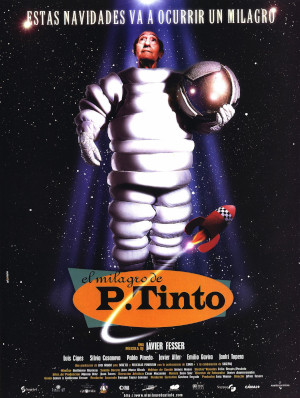Javier Fesser de Petinto found his footing in the world of advertising and, as might be expected given his background, his focus is on visual style. If the stories he tells seem rambling and incoherent to the point of madness, that is because he is not concerned with writing a proper screenplay so much as creating fantastic worlds and characters, which serve as cartoonish exaggerations of places and people in everyday life. In his first feature film, he lends his second surname to the protagonist, P.Tinto, who is played by Luis Ciges, a legend of Spanish cinema who has performed supporting roles in over 150 films and who landed his first leading part in this 1998 picture, at the age of 77.
"The film recalls a time and place which, under close scrutiny, probably wasn’t all that golden, but which is portrayed here through the filter of lost innocence."
We meet P.Tinto as a child. He falls in love with his classmate Olivia, a cross-eyed girl whose main attribute is her ability to save money, and decides to start a family with her. He is clueless about certain details – as he is clueless about most things, including the Mystery of the Holy Trinity, despite the beatings he receives from Father Marciano – but he has an epiphany when he sees an adult ask another his secret for having so many children. “ Tralalí Tralalí ,” replies the man, as he jerks his belt suspenders back and forth. P.Tinto and Olivia spend the next 50 years jerking their suspenders day and night, waiting for a seagull to deliver their baby.
Eventually, the saints hear the couple’s desperate calls for parenthood, and deliver them two Martians who have escaped from the past in a time machine (which looks exactly like a Fiat SEAT 600). They land by accident on P.Tinto’s house and soon find that being prodigal sons to an elderly couple of lunatics is more profitable than they expected. Their happiness – spurred by cakes and soda, which they find to be wonderful Earthly inventions – lasts until Joselito, a huge man-child whose mother was crushed under a crate of goat milk, finds his way to their house. P.Tinto welcomes Joselito and teaches him the only trade that has occupied his life thus far, the production of communion wafers for the Vatican.
All this doesn’t even begin to scratch the surface of what The Miracle of P. Tinto has to offer, particularly to those who are tired of watching predictable Hollywood movies. This film juggles so many different characters and storylines, that five consecutive scenes often advance five completely different subplots. This is to the credit of the screenwriter, Fesser’s brother Guillermo, who is also a journalist. Anchoring all this insanity is a wonderful performance by Ciges. His vaguely sad face has given him a reputation for playing quite and timid men, and Fesser exploits these natural advantages by having him be the straight man in what is essentially a dark comedy, making him all the more relatable and funny.

There is poignancy to the elderly couple’s plight. They only want to live by the righteous path, as set down by society and the hard teachings of Father Marciano. But nowhere in their education have they been told that they cannot produce offspring by jerking their belt suspenders. There’s also a sense of nostalgia that permeates the whole film. 60s songs abound, often with changed lyrics: “Yo tengo una vaca lechera” (I have a milking cow) becomes the official tune of the time machine the Martians plan to use in order to get Joselito away from their newfound family. These classic tunes mingle with old newsreel footage and old-school Spanish mechanics who hate foreign machinery. The film recalls a time and place which, under close scrutiny, probably wasn’t all that golden, but which is portrayed here through the filter of lost innocence.
The characters are always talking, and many of their lines showcase the inventiveness of the Spanish language. The Martians, in particular, soon become acquainted with the local slang, yelling “ahuevado” (dumb) and “mariconazo” (fruity) to each other. One of them, as he opens a soda bottle using a Virgin Mary figurine, says, “Qué pasote la de litro” (The liter bottle is a blast). Meanwhile, scenes supposedly set in Russia feature a parody language conceived by adapting Spanish words to sound like fake Russian equivalents: “Manikomiem” (Mental Asylum) and “Muërten” (Death).
Javier Fesser would go on to direct many short films, most of which are well worth watching, as well as the 2003 blockbuster La Gran Aventura de Mortadelo y Filemón , loosely based on the classic comic book by Pancho Ibáñez, which every Spanish kid has read at least once. (I confess I have not seen Fesser’s third feature, Camino , which necessarily has a more serious tone, since it deals with the real-life case of a Madrilenian 14-year-old girl with cancer.) In any case, El Milagro de P. Tinto is his flagship title, and a movie that deserves more international exposure.





